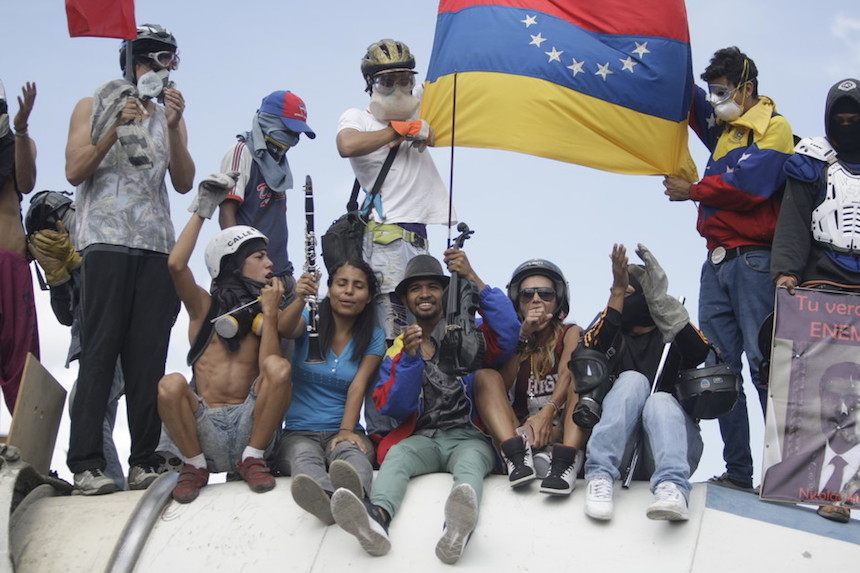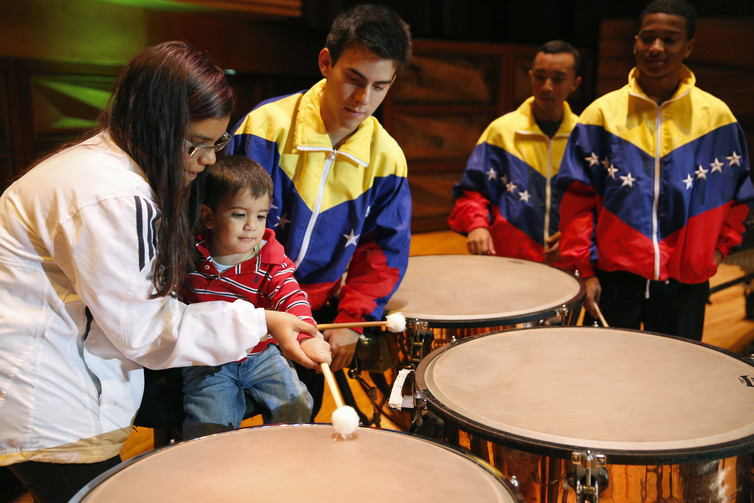
A video shows him walking slowly, arms outstretched. Minutes later, he was shot dead. Despite a lack of evidence to determine who shot Cañizales, he is one of at least 76 recent victims of the clashes between protesters and armed security forces. Since 2014, protesters and government forces have faced off amid food shortages, record-high inflation and pervasive crime in Venezuela.
Cañizales was a member of El Sistema, a state-funded Venezuelan initiative that provides free classical music education and instruments to more than half a million predominantly lower-class youth all over the country. Founded in 1975, El Sistema aims to lessen socioeconomic exclusion and everyday violence through music, and its model has been adopted in more than 35 countries around the world. It was hailed by orchestra conductor Sir Simon Rattle as “quite simply the future of music.”

As an anthropologist who studies music, youth and violence, I spent 16 months between 2011 and 2016 doing ethnographic research with El Sistema. I witnessed children in El Sistema, some as young as two, learn to play together in orchestras, listen to and be in tune with other instruments, care for and teach one another. These acts of listening between members of an orchestra and their audiences took place across the political and class chasms of Venezuela.
Now, the government is at odds with one of Venezuela’s most prized institutions. El Sistema has made a sonorous appearance on the protest stage, signaling that a wider segment of the Venezuelan population is joining anti-government protests. It points to a political and social crisis so severe that it is bringing members of Venezuelan society closer together.
Broken silence
Musicians at El Sistema have been ambivalent about expressing political opinions. Gabriela Montero, a Venezuelan pianist living abroad, repeatedly evoked El Sistema’s “moral duty to stand up against this dictatorship.” While I was in Venezuela, I saw the El Sistema musicians participate in protests, but never with their instruments. Never with their music. For many of them, these acts were tentative attempts at resistance.
Cañizales’ death broke El Sistema’s silence. El Sistema musicians are now openly protesting against the state under the banner of the institution.
After Cañizales’ death, members of El Sistema gathered in front of El Sistema headquarters in Caracas, holding a poster reading: “El Sistema cannot sound the same.” On the bottom, in red letters, was written “Armando Cañizales.”
An El Sistema youth orchestra performed the Venezuelan national anthem at Cañizales’ funeral. And in the following days, 23-year-old El Sistema violinist Wuilly Arteaga began playing the anthem on his violin at the anti-government protests. A video recently went viral of him in tears after the police wrenched the violin from his hands by its strings and broke it.
For these musicians, performing the national anthem is second nature. Even as children, El Sistema musicians are expected to play at state events. They often consider this obligation tedious. Playing the national anthem to mourn a fellow musician was an act they imbued with passion. Playing the hymn at an anti-government rally was a potent act of civil disobedience and social transformation.
Music has had similar effects on other settings. For example, I joined an El Sistema orchestra on a world tour in 2013. I saw musicians performing in bi-national orchestras, comprising children from Venezuela and South Korea who did not have a common language but shared a music stand. In Japan, a school inspired by El Sistema was created to give children affected by the Fukushima disaster a sense of community, structure and purpose.
On another occasion, I participated in rehearsals for the West-Eastern Divan Orchestra in which an Israeli violinist and a Palestinian cellist learned to bow together in the performance of Felix Mendelssohn’s “Octet.” The orchestra aims to bring together young musicians from diverse warring countries in the Middle East. These are powerful demonstrations of how young people can listen to each other across the boundaries of difference in the act of playing music together.
Reaching beyond
El Sistema musicians have struggled to find ways of opposing a government that defended the interests of the poor, without aligning with old hierarchies of privilege. Most El Sistema musicians were raised in lower-class Venezuelan barrios and did not feel at home amid protests held in middle- and upper-class parts of town. These youth are torn by loyalty to their parents, many of whom were supporters of Venezuela’s former socialist president Hugo Chávez; to the state, which sponsored their music; and to their own shifting visions of social justice.
Although El Sistema has weathered the political changes of seven different governments, Chávez and his successor Nicolas Maduro have been the most generous supporters of El Sistema to date. Days after Arteaga, the violinist, appeared on the streets of Caracas, the Venezuelan state newspaper Alba Ciudad issued an editorial denouncing the act, and reminded Arteaga that he needed to be grateful to the government for his musical education.
![]() Now, El Sistema musicians are defying their expected roles and summoning their musical skills to oppose the very government that funds them. Beyond fueling political action with creativity, the musical and social skills that these young people have acquired embody the human values that are fundamental to the creation of a new political community. The collective practice of making music is forging bonds of solidarity – trust, the ability to listen – in a fractured society.
Now, El Sistema musicians are defying their expected roles and summoning their musical skills to oppose the very government that funds them. Beyond fueling political action with creativity, the musical and social skills that these young people have acquired embody the human values that are fundamental to the creation of a new political community. The collective practice of making music is forging bonds of solidarity – trust, the ability to listen – in a fractured society.
Yana Genchova Stainova, Postdoctoral Fellow, Dartmouth Society of Fellows, Dartmouth College
This article was originally published on The Conversation. Read the original article.


